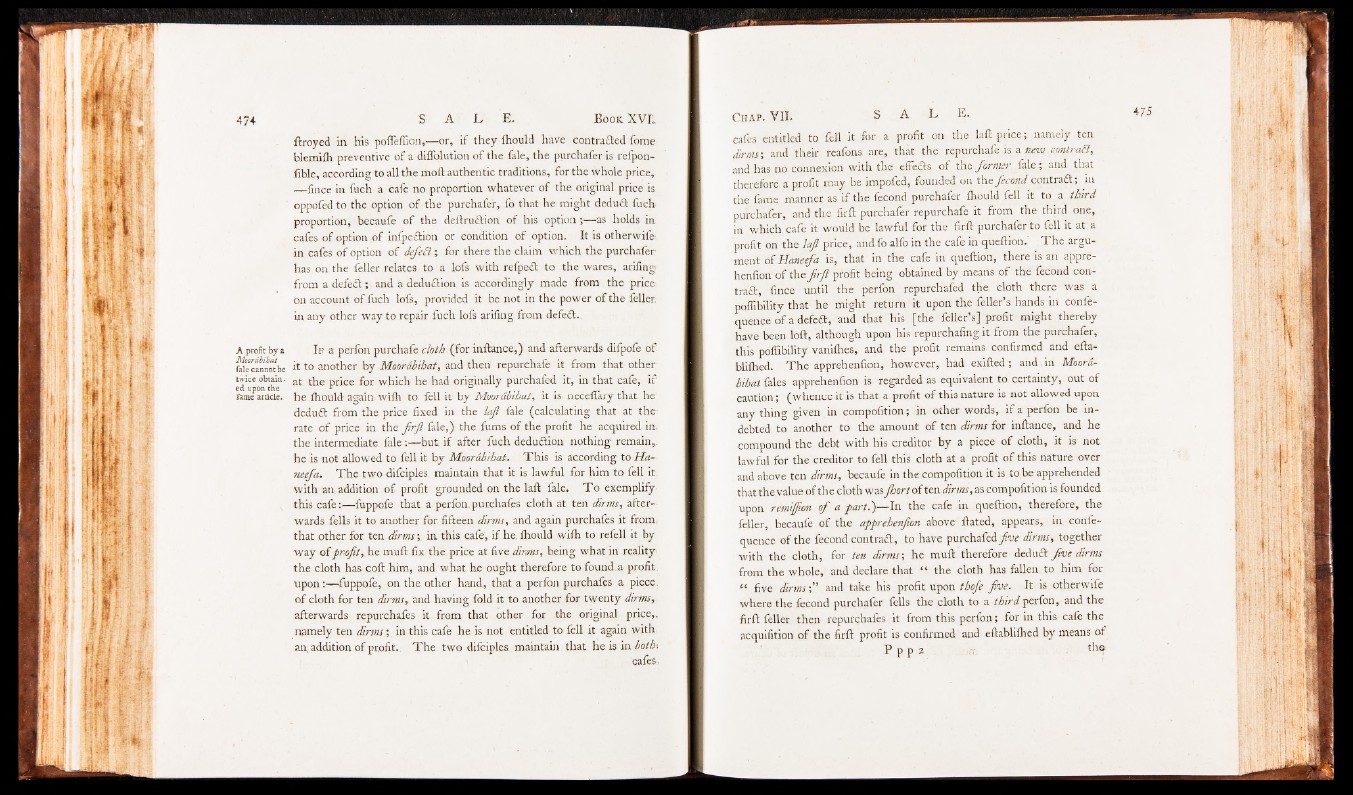
A profit by a
JMoorabibat
fale cannot be
twice obtained
upon the
fame article.
ftroyed in his poflefiion,— or, if they Ihould have contra&ed fome
blemifh preventive of a diffolution of the fale, the purchafer is refpon-
fible, according to all the mod authentic traditions, for the whole price,
— fince in fuch a cafe no proportion whatever of the original price is
oppofed to the option of the purchafer, fo that he might dedu£t fuch
proportion, becaufe of the deftrudtion of his option ;— as holds in
cafes of option of infpeftion or condition of option. It is otherwife.
in cafes of option of defeß; for there the claim which the purchafer
has on the feller relates to a lofs with refpedt to the wares, arifing.
from a defect; and a deduction is accordingly made from the price,
on account of,fuch lofs, provided it be not in the power of the feller:
in any, other way to repair fu.ch lofs arifing from defedh,
Ilf a- perfon purchafe cloth (for inftance,) and afterwards difpofe of
it to another by Moordbihat, and then repurchafe if from that- other
at the price for which he had originally purchafed it, in that cafe, if
he fhould- again, with to fell it by Moordbihat, it is neceffary that he-
dedudt from the price fixed in the laß fale (calculating that at the-
rate of price in, the firft. fale,): the. fums of the profit he acquired in.
the intermediate fale:— but if after fuch dedu&ion nothing remain,,
he is not allowed to fell it by Moordbihat. This is, according to Ha-
rnefa. The two difciples, maintain that it is lawful for him to fell it.
with an addition of profit grounded on the laft fale. T o exemplify
this cafe:.— fuppofe that a-perfon. purchafes cloth at ten Srms, afterwards
fells it to another for fifteen dirms,. and again purchafes it fromi
that other, for ten dirms-,, in. this cafe, if he. fhould wifh to refell it by
way of profit,he muft fix the price at five dirms, being what in reality
the cloth has coft him, and what he ought therefore to .found, a profit
upon:— fuppofe, on the other hand, that.a perfon purchafes a piece,
of cloth for ten aS/mr,, and. having fold it to another for twenty dirms,
afterwards repurchafes it from that other for the original price,,
namely ten dirms-,, in this cafe he is not entitled to fell it again with,
an, addition of profit. The two difciples maintain, that heis'in.
cafes.
cafes entitled to, fell it for a profit on the laft price; namely ten
dirms-, and their reafons are, that the repurchafe is a nm eontraB,
and has no connexion with the - effedts of the former .fale ; and that
therefore a profit may be impofed, founded on the fiecond contract, in
the fame manner as if the fecond purchafer fhould fell it to a third
purchafer, and the firft purchafer repurchafe it from the third one,
in which cafe it would be lawful for the firft purchafer to fell it at a
profit on the laft price, and fo alfo in the cafe in queftion.' The argument
of Haneefa is, that in the cafe in queftion, there is'an apprehenfion'
of the firfi profit being obtained by means of the fecond contrail,
fince until the perfon repurchafed the cloth there was a
poflibility that he might return it upon the feller’s hands in confe-
quence of a defea, and that his [the feller’s] profit might thereby
have been loft, although upon his repurchafing it from the purchafer,
this poflibility vanifhes, and the profit remains confirmed and efta-
blifhed. The apprehenfion, however, had exifted; and, in Moordbihat
fales .apprehenfion is regarded as equivalent to certainty, out of
caution; (whence it is that a profit of this nature is not allowed upon
anything given in compofition; in other words, if a perfon be indebted
to another to the amount of ten dirms for inftance, and he
compound the debt with his creditor by a piece of cloth, it is not
lawful for the creditor to fell this cloth at a profit of this nature over
and above ten dirms, becaufe in the compofition it is to,be apprehended
that the value of the cloth was/iwrr of ten dirms, as compofition is founded
upon remij/ion o f a part.)— In the cafe in queftion, therefore, the
feller, becaufe of. the apprehenfion above ftated, appears, in coiife-
quence of the fecond contrail, to have purchafed five dirms, together
with the cloth, for ten dirms-, he muft therefore deduct fiv e dirms
from the whole, and declare that “ the cloth has fallen to him for
“ five dirms ” and take his profit upon thofe five. It is otherwife
where the fecond purchafer fells the cloth to a third perfon, and the
firft feller then repui^hafes. it from this perfon; for in this- Cafe the
acquifition of the firft profit is confirmed and- eftablilhed by means of
P p p 2 n\